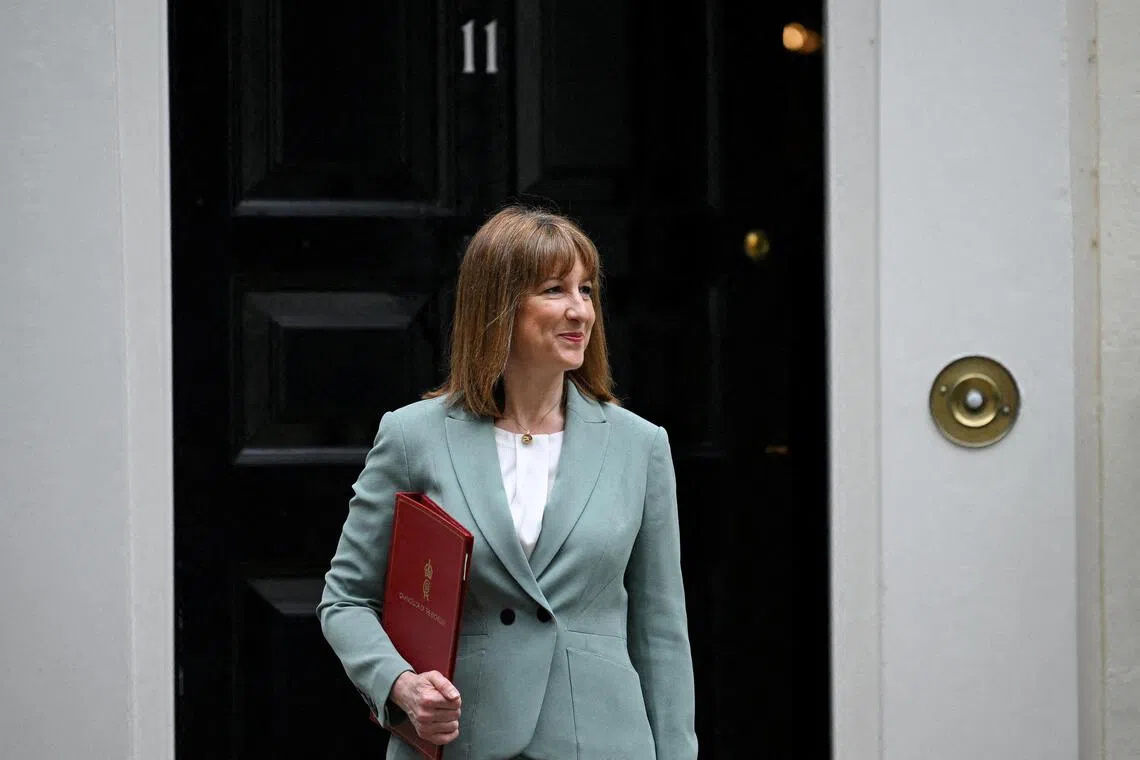Britain’s Reeves abandons plans to raise income tax rates, roiling markets
Sign up now: Get ST's newsletters delivered to your inbox

Britain's Chancellor of the Exchequer Rachel Reeves will likrly need to raise tens of billions of pounds to stay on track to meet her fiscal targets in the Nov 26 annual Budget.
PHOTO: REUTERS
Follow topic:
- Rachel Reeves, the UK Finance Minister, will not raise income tax in the upcoming Budget due to improved fiscal forecasts from the OBR.
- This policy U-turn caused UK government borrowing costs to surge, with bond prices experiencing a significant drop on November 14.
- Reeves will likely use a "smorgasbord" of smaller tax increases instead, potentially impacting lower-paid workers and damaging government credibility.
AI generated
LONDON - Britain’s finance minister, Ms Rachel Reeves, has no plans to raise income tax rates in this month’s Budget due to improved fiscal forecasts, a source said, a policy U-turn that caused government borrowing costs to surge on Nov 14.
Ms Reeves is expected to need to raise tens of billions of pounds to stay on track to meet her fiscal targets in the Nov 26 annual Budget, and financial markets had seen a rise in income tax as the surest way to achieve this.
Ms Reeves gave a keynote speech
As recently as Nov 10, she said it would not be possible to stick to this pledge without “deep cuts” to public investment.
But the latest round of forecasts from the Office for Budget Responsibility pointed to an improving fiscal outlook, two sources familiar with the matter said, one of whom confirmed the government did not plan to raise income tax in light of those latest figures.
The change in stance was first reported by the Financial Times late on Nov 13, triggering an immediate slump in British government bond prices when the market opened on Nov 14.
British government bond prices are on track for their biggest one-day fall since July 2, when a tearful appearance
A finance ministry spokesperson declined to comment on tax policy before Ms Reeves officially announced it in her Budget.
“The Chancellor will deliver a budget that takes the fair choices to build strong foundations to secure Britain’s future,” the spokesperson said.
Ms Reeves had committed to making the public finances more resilient and to give herself enough fiscal room for manoeuvre to withstand turbulence in the global economy, they said.
Markets had taken reassurance from talk of tax rises
In recent weeks, investors had taken reassurance from signals from Ms Reeves that she was prepared to take tough measures to remain on course to meet her fiscal targets of balancing the government budget by 2029/2030, excluding investment spending.
Investors have previously said they have more confidence in revenue forecasts based on increases in income tax, rather than a collection of smaller taxes which can be easier to avoid.
Economist Kallum Pickering at Peel Hunt said Ms Reeves would now likely opt for a “haphazard patchwork of smaller anti-growth tax increases”.
“That would be a bad outcome,” he said. “It would add to uncertainty, further damage the government’s already tarnished credibility, and complicate any BoE judgement to potentially offset tax rises with rate cuts.”
Benchmark 10-year gilt yields – a proxy for the cost of new government borrowing – rose by more than 0.13 percentage points to 4.575 per cent, their highest in a month. Yields on riskier longer-dated debt rose by more.
One revenue-raising alternative for Ms Reeves was to cut the thresholds at which people pay different rates of income tax.
Mr Paul Johnson, a former director of the Institute of Fiscal Studies think-tank, told BBC radio that such a move could raise large amounts of money for the Treasury but would disproportionately hurt lower-paid workers.
One source familiar with the matter said that no final decisions had been made, and there was still another round of OBR forecasts to come which could yet change fiscal estimates used for the budget.
Think-tanks have warned of need to raise money
The National Institute of Economic and Social Research, a leading think-tank, had warned that Ms Reeves needed to embark on major tax rises to avoid a repeat of the loss of market confidence that cost former prime minister Liz Truss her job.
The FT said the decision to change plans, taken this week, was communicated to the Office for Budget Responsibility on Nov 12. It cited people briefed on the revised plans as saying Ms Reeves would instead rely on a “smorgasbord” approach of hiking a range of narrowly drawn taxes.
Ms Reeves and Prime Minister Keir Starmer said before the 2024 election that they would not raise taxes for “working people”, including income tax, social security contributions and value-added tax.
The pledge was designed to reassure voters that a Labour government would not resort to ideological tax-and-spend policies.
But at its first Budget a year ago, it raised £40 billion (S$50 billion) to invest in national infrastructure and improved public services, mostly through higher levies on business.
The economic outlook has deteriorated since then. REUTERS

